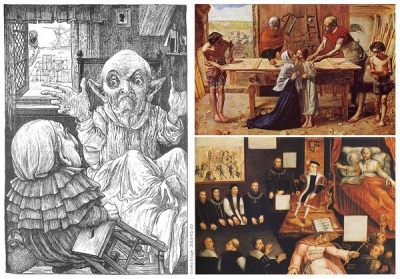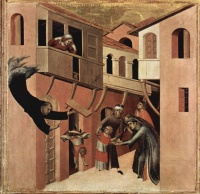Window
From The Art and Popular Culture Encyclopedia
|
Related e |
|
Featured: |
- An opening, usually covered by one or more panes of clear glass, to allow light and air from outside to enter a building or vehicle.
- 1952: A window is an opening in a wall to admit light and air. — L.F. Salzman, Building in England, p. 173.
- An opening, usually covered by glass, in a shop which allows people to view the shop and its products from outside.
- A period of time when something is available.
- launch window
- window of opportunity
Unless indicated otherwise, the text in this article is either based on Wikipedia article "Window" or another language Wikipedia page thereof used under the terms of the GNU Free Documentation License; or on research by Jahsonic and friends. See Art and Popular Culture's copyright notice.

Windows as elements in illustrations and paintings - Left: Henry Holiday's depiction of the Baker's uncle (in Lewis Carroll's The Hunting of the Snark, 1876) with some of the Baker's 42 boxes outside of the window. Right top: John Everett Milais: Christ in the House of his Parents (aka The Carpenter's Shop, 1850, Pre-Raphaelite) with a flock of sheep outside of the window symbolizing the the laity). Right bottom: Edward VI and the Pope: An Allegory of Reformation (mirrored view, 16th century) with a violence scene of the reformation depicted outside of the window.


